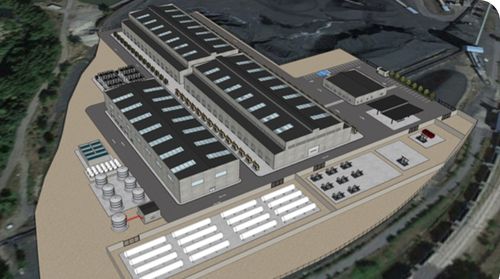The renewable hydrogen project in La Robla (León), promoted by Naturgy and Enagás Renovable, has been selected by the European Commission to receive 42 million euros in funding through the European Union Innovation Fund. This program aims to accelerate the implementation of innovative technologies that contribute to decarbonization by supporting the development of low-carbon initiatives.
A key project for the energy transition
The renewable hydrogen production plant, with a capacity of up to 280 MW, will be located on the site of Naturgy’s former thermal power plant, currently undergoing dismantling. Its construction will be accompanied by the installation of several solar photovoltaic parks in neighboring municipalities, reinforcing the commitment to clean energy generation.
The renewable hydrogen produced in La Robla will play a key role in industrial decarbonization, with Fertiberia as its main potential consumer. This project is expected to prevent the emission of more than 430,000 tons of CO₂ annually, contributing to the sustainability of industrial processes and the advancement of zero-emission mobility.
Additionally, the plant’s development will be coordinated with the decarbonization plans of the sectors benefiting from its production and with Spain’s hydrogen transport infrastructure, ensuring efficient integration into the national energy system.
The La Robla project is part of a larger initiative within the Innovation Fund, which in this third call has provided funding to 41 innovative projects across 15 European countries, including Spain. Collectively, these projects are expected to prevent 221 million tons of CO₂ emissions in their first decade of operation, accelerating the transition to more sustainable energy sources.
The selected projects span a wide range of sectors and countries, including Austria, Belgium, Croatia, Czechia, Denmark, Finland, France, Germany, Greece, Ireland, Italy, the Netherlands, Portugal, Sweden, and Norway. All are scheduled to begin operation before 2030, driving technological development and emissions reductions across various industries.
Renewable hydrogen: the new ally for decarbonization
Renewable hydrogen is produced through electrolysis, a process that separates hydrogen from oxygen in water using electricity from renewable sources. Unlike other production methods, this system does not generate emissions, making it a key ally in the fight against climate change.
This type of energy plays an essential role in decarbonizing sectors that are difficult to electrify, such as hydrogen-intensive industries, heavy long-distance transport, maritime shipping, and rail transportation. Additionally, its potential as an energy vector allows its use in storage and energy system integration.
The La Robla project has been enthusiastically received by its promoters. Antón Martínez, CEO of Enagás Renovable, stated: “This project reinforces our commitment to the energy transition and will help support the decarbonization of industries in the region. The funding received is key to making this vision a reality and accelerating the shift to more sustainable energy.”
Meanwhile, Silvia Sanjoaquín, Director of New Business at Naturgy, emphasized: “Securing this funding is a major milestone for the La Robla hydrogen project and strengthens our commitment to decarbonization through the development of renewable gases and the economic revitalization of Just Transition zones.”
A year after the project presentation in La Robla
The confirmation of funding comes almost a year after the project’s presentation in La Robla by Enagás Renovable and Naturgy executives. The event was attended by institutional representatives, including Sara Aagesen, Secretary of State for Energy, who underscored the importance of renewable hydrogen for a just transition and its role in regional reindustrialization.
This financial support strengthens the project’s viability and marks a key step in the transition to a more sustainable energy model, positioning Spain and Europe as leaders in renewable hydrogen development.

